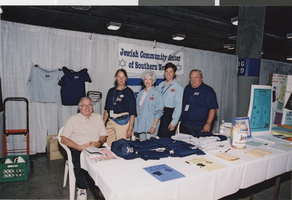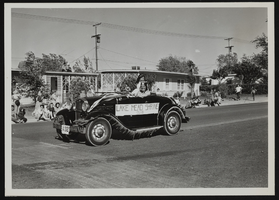Search the Special Collections and Archives Portal
Search Results

Transcript of Interview with Marzette Lewis, 2012
Date
Archival Collection
Description
Marzette Lewis is an outspoken community activist, especially in the area of local education. She is the founder of the WAAK-UP group. The interview took place over two sessions, session 1 was recorded October 30, 2012 and session 2 was recorded November 14, 2012.
Text
Transcript of interview with Hank Greenspun by Perry Kaufman, 1975
Date
Archival Collection
Description
Hank Greenspun discusses coming to Las Vegas in the 1940s, his journalistic endeavors, and some of the politics that affected him.
No release form is on file for this interview. The interview is accessible onsite only, and researchers must seek permission from the interviewee or heirs for quotation, reproduction, or publication. Please contact special.collections@unlv.edu for further information.
Text

Rosamond McDougal interview, February 14, 1979: transcript
Date
Archival Collection
Description
On February 14, 1979, Concepcion Fernandez interviewed Rosamond McDougal (born in Texas) about her life as a teacher in Las Vegas. McDougal speaks primarily about her time as a teacher in the Clark County School District, her unique class setup and the district’s changes. Moreover, McDougal speaks about the growing number of students and teachers, the superintendent’s role in bond issues, the courses offered, racial integration in the school district (and the casinos), and the building of the University of Nevada, Las Vegas. McDougal gives personal anecdotes about her family, her husband’s job at the Atomic Test Site and her time as an organ player in churches around the city. Lastly, she talks about recreational activities, Helldorado, the casinos and department stores.
Text

Barbara Millington interview, March 2, 1980: transcript
Date
Archival Collection
Description
On March 2, 1980, collector David Mowrey interviewed Barbara Millington (born July 3rd, 1937 in Oak Creek, Colorado) at her home in Las Vegas, Nevada. In this interview, Mrs. Millington discusses moving to Las Vegas, Nevada with her family and working various jobs including at Vegas Village and becoming a bookkeeper at a construction firm. She also speaks about the changes she has seen in Las Vegas, such as how casinos were when she first came here compared to how they are now. She ends the interview talking about the need for Las Vegas to find industry outside of gaming. She discusses the need for young people to come back after going away to college to improve the city.
Text

Photograph of Israel Independence Day Celebrations, May 4, 2003
Description
Photograph of the Jewish Community Center booth at Israel Independence Day celebrations, May 4, 2003.

Floats in the Henderson Industrial Days Parade: photographic print
Description

Andrew Walsh oral history interview: transcript
Date
Archival Collection
Description
Oral history interview with Andrew Walsh conducted by Barbara Tabach and Claytee D. White on February 13, 2019 for the Remembering 1 October Oral History Project. In this interview, Walsh recalls his early life in New York City, New York, and working for the New York Police Department. He then recalls moving and joining the Las Vegas Metropolitan Police Department in 1998. He discusses his current position as Deputy Chief/Division Commander of Tourist Safety, his role in the aftermath of the October 1, 2017 mass shooting at the Route 91 Harvest Festival, and community healing.
Text

Transcript of interview with Wayne Earl by Diane Donovan, March 14, 1981
Date
Archival Collection
Description
On March, 14, 1981, collector Diane Donavan interviewed her neighbor, pharmacist Wayne Earl (born June 21, 1926 in St. George, Utah) at the collector’s home in Las Vegas, Nevada. This interview covers Earl’s early recollections of Nevada and his life after moving to Las Vegas in 1940. Earl also talks about World War II, McCarran Airport, Nellis Air Force Base, North Las Vegas politics, Jaycees, and the Chamber of Commerce. Additionally, Earl recalls his involvement in civic affairs, social and religious activities, including his affiliation with the Mormon Church.
Text

Transcript of interview with Paul Bowerman by Frances Harelik, March 5, 1976
Date
Archival Collection
Description
Text

Christina Gruber oral history interview: transcript
Date
Archival Collection
Description
Oral history interview with Christina Gruber conducted by Barbara Tabach on March 2, 2019 for the Remembering 1 October Oral History Project. In this interview, Gruber shares her experience living in Las Vegas, Nevada since 1997 and as a Certified Public Accountant (CPA), mother of two, and physical fitness enthusiast. She recalls being shot during the Route 91 Harvest Festival and being rescued by strangers. She recalls the chaos of the evening, but also how strangers worked together to comfort each other amidst the terror. She discusses dedicated her athletic races to those who were murdered that evening, and how it has helped her recovery.
Text
